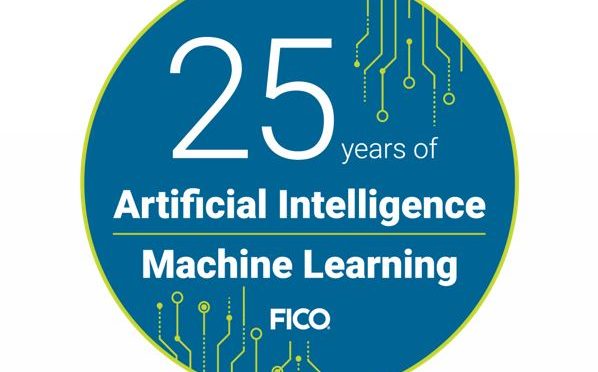The Future of AI: Smart Machines Will Save Us, Not Destroy Us
Blog: Enterprise Decision Management Blog

To commemorate the silver jubilee of FICO’s use of artificial intelligence and machine learning, we asked FICO employees a question: What does the future of AI look like? The post below is one of the thought-provoking responses, from Shafi Rahman, a principal scientist at FICO, working in Bangalore.
The most memorable scene in the film 2001: A Space Odyssey is when HAL 3000 turns off the life-support functions of the crew in an attempt to keep itself from getting disconnected. This was my first encounter with what we call artificial intelligence. Then in Terminator, we were introduced to Skynet, a neural network based AI, which raised an army of robots for self-preservation.
Hollywood has always portrayed the future of AI in a dystopian, cataclysmic manner. In reality, I believe things will be different — benign and beneficial to the human-kind.
In the last 10 years, we have seen huge revival in the research and development of AI. This has been fueled primarily by our ability to train deep neural networks using larger and larger training datasets, riding on faster and better CPUs and GPUs, Big Data and innovations in algorithms.
AI is poised to evolve faster than ever in the next decade. And yet, we are not going to witness the kind of man-versus-machine showdown that we have seen in Hollywood movies. On the contrary, AI will lead to major improvements in all dimensions of our lives within the next 10 years.
AI Will Save Lives
Take the ongoing research in the application of AI in medical sciences. The early results coming out of labs are nothing but positive. Samsung, for example, announced last year that its ultrasound devices can now identify breast cancer and even advise whether it’s benign or malignant, using AI that analyses ultrasound images. Similarly, using AI based on speech recognition and analysis, scientists have devised early detection capability for onset of Parkinson’s disease, with the claimed detection rate of 99%. Merck gave huge cash prizes for discovering new drugs using AI.
In fact, there is an entire research journal, Artificial Intelligence in Medicine, dedicated to the research in the application of AI in medicine, human biology and health care. This rapid progress leads me to believe that within the next 10 years, there will be faster and earlier diagnosis of all diseases at a much lower cost, and the drugs and treatments will be much more effective. Doctors could routinely use AI systems for second opinions, and medical mistakes would be things of the past. These would lead to saving of millions of lives across the globe each year, and improve quality of medical outcomes dramatically.
AI Will Make Workers’ Lives Better and the Earth Greener
In the past, automation has saved people from drudgery and elevated the quality of life by making work environment safer, while letting us do more intellectually satisfying and physically less demanding jobs. In the current wave of automation, led by the resurgence in AI, I don’t expect the outcome to be any differently, though like earlier, there will be disruptions.
The American Trucking Associations predicts that a total of nearly 900,000 new drivers will be needed over the next eight years and there are 50,000 jobs currently vacant due to lack of drivers. This is the kind of scenario where AI would step in and fill the gap. As Harvard Technology Review reports, any self-driving truck will require a driver to remain on board to take over the control in cases which AI can’t handle. The job itself will become less stressful, leading to fewer mistakes and road accidents. The trucks will run continuously on the road, reducing the time and cost and making things cheaper. The fuel efficiency will go up by as much as 30% when AI takes control, leading to a greener planet.
If the use of AI in trucking industry is any indication, in the next ten years, jobs will often require interplay with AI based systems. It will reduce effort and increase efficiency of the workers. The side effects would almost always include better quality of life, better and cheaper products, happier employees and customers and a green earth. Societies would evolve to help those affected by the job displacements, while continuous and on-the-job learning would become de facto standard.
AI Will Reduce Cyber-Crime and Money Laundering
At FICO we have been leveraging artificial intelligence to help our clients make their decisions smarter. It has been 25 years since we got our first patent in application of AI for fraud detection in the payment card space. This led to a rapid decline in card fraud across all of the USA within a very short time.
Since then we have extended the AI offerings to include self-learning models, and its application in diverse spaces like cybersecurity. We expect that in the next 10 years, the AI capabilities of FICO can dramatically reduce the threat of cyberattacks on computer networks and connected IoT devices by identifying even the most subtle forms of intrusions and isolating vulnerabilities. In the next 10 years, our AI capabilities could make money laundering and terrorism financing virtually impossible. One can even imagine the same technology being extended to make it impossible for criminals and terrorists to hide their activity and avoid scrutiny. In conjunction with AI-based facial recognition system, it would be impossible for them to avoid detection.
AI for Good, Not Evil
Predicting the future is a hard business even for those of us who make living out of using AI to predict future outcomes. Progress of technology is not always linear. It does lead to disruption. Unintended things happen. But then we learn to deal with the negative fall-outs, do a course correction and steer the technology towards the greater good.
The path of the future of AI shouldn’t be any different. And there is already a good line of sight into what the future of AI would be like in the next 10 years. So while things may get difficult at times, I expect that we won’t be encountering Skynet or HAL anytime soon. On the contrary, we will have healthier population, happier employees and customers, more profitable businesses, less crime and a safer planet.
See other FICO posts on artificial intelligence.
The post The Future of AI: Smart Machines Will Save Us, Not Destroy Us appeared first on FICO.
Leave a Comment
You must be logged in to post a comment.







